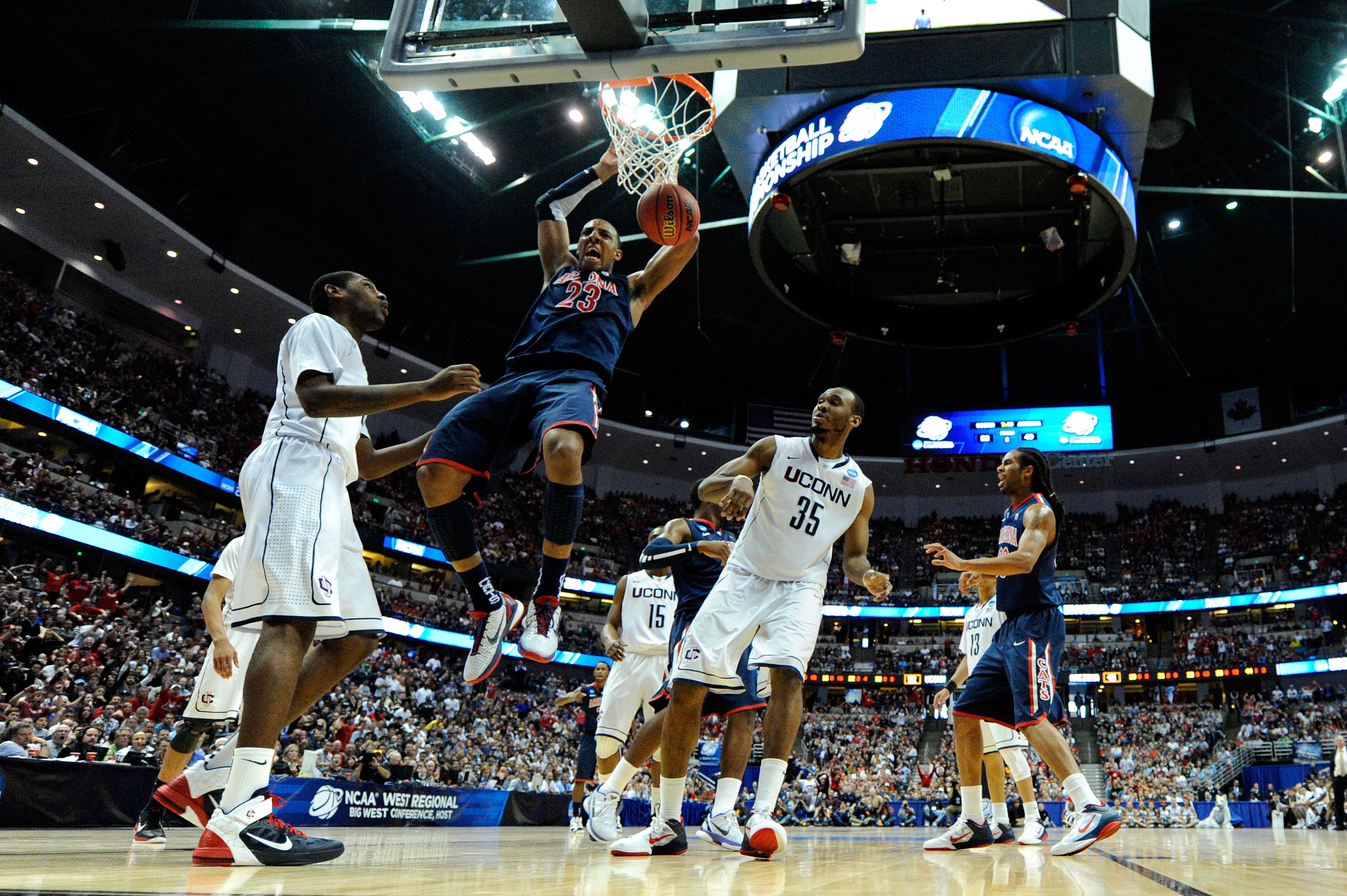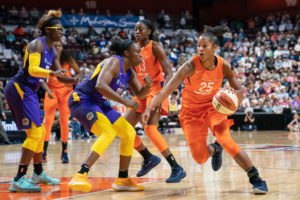March is, historically, the NCAA’s favorite month, with tournament basketball in full swing and revenues cascading into league coffers. But this year’s festivities come as the entire collegiate athletic establishment finds itself suddenly faced with two legal challenges to its collusive practice of prohibiting college athletes from earning money: one in which the players seek to unionize, and the other in which they seek the right that every other American enjoys to be paid for their labor. It’s well past time that they are afforded that most fundamental right.
The NCAA is a case study in hypocrisy and contradictions. Consider the following:
It’s an organization that supposedly exists to foster competition, but it colludes with its member institutions to prevent free market competition for the services of the players.
It justifies not paying its athletes by extolling the virtues of amateurism, while making millionaires out of its coaches, athletic directors, and officers.
It pretends to emphasize educational excellence, but when it comes to big money sports it turns a blind eye to schools aggressively lowering admissions standards for many woefully underqualified, and often outright illiterate “student-athletes” who are little more than ringers.
It claims to be concerned with its athletes getting an education, but by preventing the athletes from earning money the schools practically force them to turn professional instead of stay in school.
It’s a “non-profit” organization, but has commercialized itself to such an extent that it holds over $600 million in assets and rakes in close to $1 billion per year, while the sixty-five “non-profit” schools that make up the five major “non-profit” power conferences — the ACC, Big Twelve, Big Ten, Pac-12, and SEC — combined for $5.15 billion in revenue in 2011-12.[1]
On that last point, this should dispel as misnomer the idea that these athletes don’t earn money. They absolutely earn money. A lot of it. The problem is that the players don’t get to touch any of it. Seventy NCAA schools pay their football coach over $1 million, with fifty making over $2 million. The highest paid college basketball coach, Duke’s Mike Krzyzewski, makes $7.2 million. The “non-profit” NCAA pays its president, Mark Emmert, $1.7 million. But God forbid a player like Heisman trophy winner Johnny Manziel makes a few hundred dollars off the field by trying to sell autographs, and the NCAA practically criminalizes him, launching investigations with such fervor and intensity you’d think these kids were trying to smuggle Nigerian yellowcake into the country.
Yeah, the NCAA cares about these kids. That’s why they assassinate their character at the slightest infraction of their anti-capitalist, anti-American, cartel-like rules.
And then they have the audacity to complain when these kids leave school early to pursue professional careers, whining to the professional leagues that they’re stealing (i.e., “paying”) their players, even though the entire purpose of college is to be a steppingstone to one’s profession.
Worse than that, despite claiming to be concerned about their education, the NCAA refuses to re-admit these athletes to collegiate competition should they change their mind about turning professional and seek to return to school.
The pretextual justification for not paying the athletes offered by the NCAA and others making money off of their pool of highly-valuable free labor — and this is always said with an air of supreme self-righteousness — is that college sports is amateur in nature, so, by definition the athletes should not be paid. But there are all sorts of problems with this argument, not the least of which is, as mentioned, that the NCAA and its member organizations cannot claim to be amateur in nature while being so heavily commercialized.
Secondly, the argument is entirely circular: the athletes are not paid because they are amateurs, and they are amateurs because they are not paid. But these athletes are professionals in every sense of the word. They put in as many hours to their craft as any adult with a full time job, and they create untold amounts of wealth. To refuse to pay them does not make them amateurs. It makes them indentured servants.
Third, the NCAA and its apologists like Dick Vitale, Jay Bilas, and the rest of the pundit hypocrites who make tons of money off of these athletes without so much as saying “thank you,” have never offered a coherent explanation of why amateurism is supposedly so virtuous and superior, and how paying the athletes would in any way harm the product. Did Tiger Woods become less compelling when he became a professional? Michael Jordan? Any notable athlete??? Of course not.
We heard the same silly argument about the Olympics, and not only has the Olympics not been ruined by the participants earning money (how could it?), in many Olympic sports it’s precisely the participation of the professional athletes that makes the competition worth watching. Just about all of the notable Olympic athletes earn money from their talent. Good for them.
Besides, the entire historical justification for amateurism is repugnant, designed as it was to exclude from athletic competition society’s poor, who, being manual laborers, tended to have noticeable physical advantages over the gentlemanly class. According to Olympic historian Bill Mallon:
“Amateurism really started when the people who were rowing boats on the Thames for a living started beating all the rich British aristocrats. That wasn’t right. So they started a concept of amateurism that didn’t exist in ancient Greece, extending it more and more to the notion of being a gentleman, someone who didn’t work for a living and only did sport as a hobby.”
Because the poor could not afford to play sports for free, they were effectively prohibited from competing. Just as the poorer athletes today find it cost prohibitive to remain in the collegiate amateur ranks.
With the pretext of amateurism no longer passing the smell test — some have rightly taken to referring to college athletics as “sham-ateurism” — and the specter of losing the legal challenges suddenly very real, (indeed, though the NCAA will appeal, a regional National Labor Relations Board has already granted Northwestern players the right to organize), the NCAA has resorted to raising all sorts of other concerns that don’t really hold water, and serve little purpose other than to distract from the ultimate issue. It has claimed, for example, that to pay athletes would run afoul of Title IX, the federal legislation that requires schools to provide the same number of scholarships to its male and female athletes alike (and which, in the process, amassed a well-documented history of destroying men’s programs. Indeed, by some estimates as many as 2,200 men’s programs have been cut since the early 1980’s for Title IX compliance purposes, denying scholarship opportunities to hundreds of thousands of men). But Title IX simply prohibits discrimination on the basis of gender. It does not prohibit discrimination on the basis of market value, or really speak at all to the issue of university employees, as opposed to, well, students. Further, Title IX has nothing to do with athletes earning money from outside sources such as through endorsements, or paid appearances, which the NCAA currently prohibits because, after all, if there’s any money to be made, the NCAA cartel wants it for itself.
Another nonsensical argument is that paying athletes would result in tax consequences to the athletes that do not come with scholarships. So what? It’s nice of the NCAA to suddenly concern itself with the financial well-being of the athletes it has been exploiting, but if these athletes would rather be paid in taxable income than by way of a scholarship, that’s their business. And by the way, they’re already supposed to be paying taxes on these scholarships as it is, because under the existing I.R.S. code, specifically Sec. 117(c), scholarships that represent payment for and are conditioned on a service provided (as opposed to academic achievement) are absolutely not tax exempt.[2]
Enough already. The NCAA has for too long had a monopoly on the lucrative revenues created by elite collegiate competition, and it has abused it. It could have avoided these legal challenges by crafting an arrangement that fairly compensated these players, and still left plenty of money for everyone else to get rich. But it chose to be greedy, and now it has to face the music.
The irony is that losing these legal challenges might actually be in the best interests of the NCAA, because by paying the athletes, or at least allowing them to earn money on their own accord, the players will stay longer and the product on the field and court will be improved. The schools might even save some money because with less player turnover the recruiting budgets can be reduced, and allowing players to collect endorsement and outside money will eliminate much of the need for the schools to subsidize the players. Then again, maybe the legal process will do precisely what the NCAA is warning that it might, which is fundamentally transform college athletics as we know it. If so, all the better.
[1] According to the lawsuit filed in federal court, in 2010 CBS and Turner gave the NCAA a 14 year, $11 billion contract. ESPN also paid the NCAA $5.64 billion for a 12-year contract to broadcast the upcoming College Football Playoffs, on top of an additional $220 million annually for the right to broadcast the less important games. That doesn’t even include the money the NCAA makes from licensing agreements with video game manufacturers and clothing designers, for example, or even ticket sales, or concessions.
It also doesn’t include the television contracts that the individual conferences have with the various stations. Again, according to the same lawsuit:
(a) The ACC receives $3.6 billion from ESPN through 2026-27, a per-school average of $17.1 million per year.
(b) The Big 12 receives $1.17 billion from Fox through 2024-25 and $480 million from ESPN through 2015-16, a per-school average of $15 million per year.
(c) The Big Ten receives $2.8 billion from its own Big Ten Network through 2031-32, $1 billion from ESPN through 2016-17, $145 million from Fox through 2016 just to broadcast the conference football championship game, and $72 million from CBS through 2016-17, a per-school average of $20.7 million per year.
(d) The Pac-12 receives a combined $3 billion from Fox and ESPN through 2023-24, a per-school average of $20.8 million per year.
(e) The SEC receives $2.25 billion from ESPN through 2023-24 and $825 million from CBS through 2023-24, a per-school average of $14.6 million per year.
[2] 26 U.S. Code 117(a)-(c): “Gross income does not include any amount received as a qualified scholarship by an individual who is a candidate for a degree at an educational organization… [This exemption] shall not apply to that portion of any amount received which represents payment for teaching, research, or other services by the student required as a condition for receiving the qualified scholarship or qualified tuition reduction.” (Emphasis added).


